|
Printables |
PowerPoints |
Online exercises |
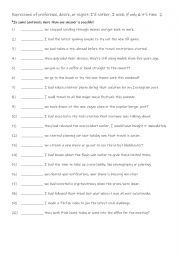
|
Expressions of preference, desire, or regret I�d rather, I wish, if only & it�s time 2
Students should learn expressions of preference, desire, or regret like "I�d rather," "I wish," "If only," and "It�s time" because they help them communicate personal feelings, make choices, and reflect on past experiences or future possibilities in English. These phrases allow students to express what they want, what they regret, or what they feel...
Level: elementary
Age: 10-100
Type:
Downloads: 107
|
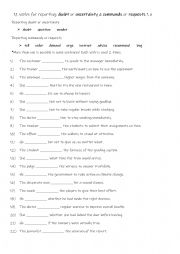
|
11 verbs for reporting doubt or uncertainty & commands or requests 1a
First, students need to familiarise themselves with the 11 verbs and check their meaning. Then they read the sentences to see which one is needed to complete the sentence. Each word is used 2 times! Answers on page 2.
Level: elementary
Age: 9-100
Type:
Downloads: 113
|
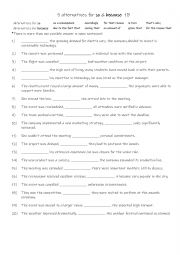
|
5 more alternatives for so & because 1b
First, students need to familiarise themselves with the 10 words and check their meaning and use. Then they read the sentences to see which one is needed to complete the sentence. Each word is used 2 times! Answers on page 2.
Level: elementary
Age: 8-100
Type:
Downloads: 102
|
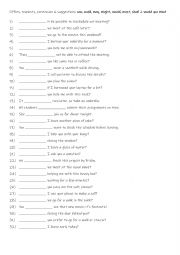
|
B1 Offers, requests, permission & suggestions - can, could, may, might, would, must, shall & would you mind
First, students familiarise themselves with the 8 modal verbs and their usage. Then they read the sentences to see which modal verb is needed to complete the sentence. Each modal is used 4 times. Answers on page 2.
Level: intermediate
Age: 8-100
Type:
Downloads: 105
|
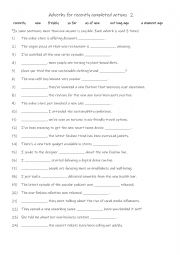
|
7 adverbs for recently completed actions 2
First, students need to familiarise themselves with the 7 adverbs. Then they read the sentences to work out which one is needed to complete the gap-fill. Each adverb is used 3 times! Answers on page 2
Level: elementary
Age: 9-100
Type:
Downloads: 104
|
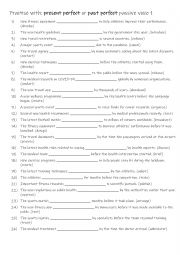
|
B1-B2 Practise with present perfect or past perfect passive voice 1
Students should learn to practise the present perfect and past perfect passive voice because these structures are vital for expressing completed actions with emphasis on the results rather than the doer. The present perfect passive (e.g., "The work has been finished") is used to discuss actions that affect the present, while the past perfect passiv...
Level: intermediate
Age: 10-100
Type:
Downloads: 115
|
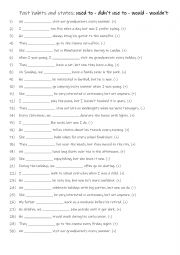
|
B1-B2 Past habits and states - used to - didn�t use to - would - wouldn�t practise
Students complete the sentences with the correct form of the verb using (+) for positive and (-) for negative verb constructions. Obviously, would cannot be used with state verbs, but can and should be used to contrast the past instead of just using used to. A selection of possible answers on page 2.
Level: intermediate
Age: 9-100
Type: worksheet
Downloads: 118
|
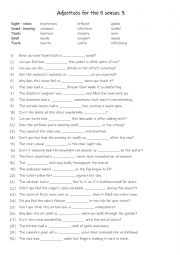
|
A2+-B1 Adjectives for the 5 senses 3
Mastering such language fosters creativity, improves storytelling, and builds confidence in expressing sensory experiences. Ultimately, this enriches their ability to communicate thoughts, emotions, and observations effectively in both academic and real-world settings. First, students need to familiarise themselves with 15 adjectives and check thei...
Level: elementary
Age: 9-100
Type:
Downloads: 105
|
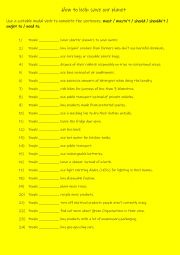
|
Ways to help save our planet
A gap-fill activity using various modal verbs. After completing the sheet, students can either do pair / group work to expand the topic by giving reasons , benefits , downside of doing each of the 24 activities.
Level: elementary
Age: 10-100
Type:
Downloads: 123
|
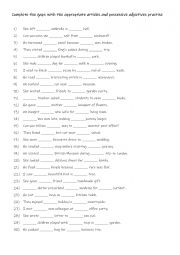
|
Complete the gaps with appropriate articles and possessive adjectives practise
Students read the sentences and decide what article is needed and what possessive adjective will complete the exercise. Answers on page 2.
Level: elementary
Age: 10-100
Type:
Downloads: 123
|
|
|
|
|












